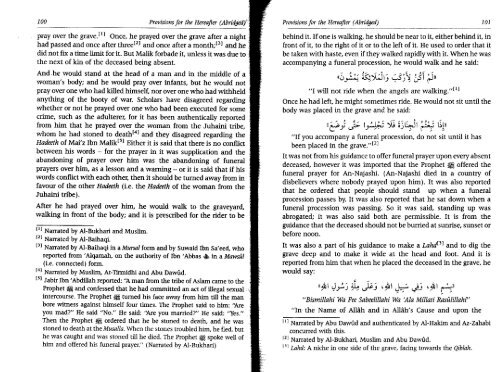Provisions for the Hereafter (Zaad Al-Ma'ad)
Provisions for the Hereafter (Zaad Al-Ma'ad)
Provisions for the Hereafter (Zaad Al-Ma'ad)
Create successful ePaper yourself
Turn your PDF publications into a flip-book with our unique Google optimized e-Paper software.
ovisions 100 <strong>Provisions</strong> <strong>for</strong> <strong>the</strong> <strong>Hereafter</strong> <strong>Hereafter</strong> (Abridged)/ (Abridged) 101<br />
pray over <strong>the</strong> grave.M Once, he prayed over <strong>the</strong> grave after a nigh<br />
had passed and once after three [23 and once after a month; (33 and he<br />
did not fix a time limit <strong>for</strong> it. But Malik <strong>for</strong>bade it, unless it was due to<br />
<strong>the</strong> next of kin of <strong>the</strong> deceased being absent.<br />
And, he would stand at <strong>the</strong> head of a man and in <strong>the</strong> middle of a<br />
woman's body; and he would pray over infants, but he would not<br />
pray over one who had killed himself, nor over one who had withheld<br />
anything of <strong>the</strong> booty of war. Scholars have disagreed regarding<br />
whe<strong>the</strong>r or not he prayed over one who had been executed <strong>for</strong> some<br />
crime, such as <strong>the</strong> adulterer, <strong>for</strong> it has been au<strong>the</strong>ntically reported<br />
from ay<br />
him that he prayed over <strong>the</strong> woman from <strong>the</strong> Juhaini tribe,<br />
whom he had stoned to deathi 41 and <strong>the</strong>y disagreed regarding <strong>the</strong><br />
Hadeeth of Mai'z Ibn Malik [51 Ei<strong>the</strong>r it is said that <strong>the</strong>re is no conflict<br />
between his words — <strong>for</strong> <strong>the</strong> prayer in it was supplication and <strong>the</strong><br />
abandoning of prayer over him was <strong>the</strong> abandoning of funeral<br />
prayers over him, as a lesson and a warning — or it is said that if his<br />
words conflict with each o<strong>the</strong>r, <strong>the</strong>n it should be turned away from in<br />
favour of <strong>the</strong> o<strong>the</strong>r Hadeeth (i.e. <strong>the</strong> Hadeeth of <strong>the</strong> woman from <strong>the</strong><br />
Juhaini tribe).<br />
After he had prayed over him, he would walk to <strong>the</strong> graveyard,<br />
walking in front of <strong>the</strong> body; and it is prescribed <strong>for</strong> <strong>the</strong> rider to be<br />
in Narrated by <strong>Al</strong>-Bukhari and Muslim.<br />
PI Narrated by <strong>Al</strong>-Baihaqi.<br />
I 3) Narrated by <strong>Al</strong>-Baihaqi in a Mursal <strong>for</strong>m and by Suwaid Ibn Sa'eed, who<br />
reported from '<strong>Al</strong>qamah, on <strong>the</strong> authority of Ibn 'Abbas 4), in a Mawsi'd<br />
(i.e. connected) <strong>for</strong>m.<br />
[41 Narrated by Muslim, At-Tirmidhi and Abu Davvild.<br />
[5) Jabir Ibn 'Abdillah reported: "A man from <strong>the</strong> tribe of Aslam came to <strong>the</strong><br />
behind it If one is walking, he should be near to it, ei<strong>the</strong>r behind it, in<br />
front of it, to <strong>the</strong> right of it or to <strong>the</strong> left of it. He used to order that it<br />
be taken with haste, even if <strong>the</strong>y walked rapidly with it. When he was<br />
accompanying a funeral procession, he would walk and he said:<br />
Prophet #4 and 41 confessed that he had committed an act of illegal sexual<br />
j..1)!<strong>Al</strong>ji) I c,..10, »<br />
intercourse. The Prophet itt turned his face away from him till <strong>the</strong> man<br />
"Bismillahi Wa Fee Sabeelillahi Wa '<strong>Al</strong>a Millati Rasidillahr<br />
bore witness against himself four times. The Prophet said to him: "Are<br />
you mad?" He said "No." He said: 'Are you married?" He said: "Yes."<br />
"In <strong>the</strong> Name of <strong>Al</strong>lah and in <strong>Al</strong>lah's Cause and upon <strong>the</strong><br />
Then <strong>the</strong> Prophet itg ordered that he be stoned to death, and he was<br />
Narrated by Abu Dawthl and au<strong>the</strong>nticated by <strong>Al</strong>-Hakim and Az-Zahabi<br />
stoned to death at <strong>the</strong> Musalla. When <strong>the</strong> stones troubled him, he fled, but<br />
concurred with this.<br />
he was caught and was stoned till he died. The Prophet A spoke well of<br />
121 Narrated by <strong>Al</strong>-Buldiari, Muslim and Abu Dawild.<br />
him and offered his funeral prayer." (Narrated by <strong>Al</strong>-Bukhari)<br />
P1 Land: A niche in one side of <strong>the</strong> grave, facing towards <strong>the</strong> Qiblah.<br />
Li-j *C1, ,<br />
"I will not ride when <strong>the</strong> angels are walking." i' 1<br />
Once he had left, he might sometimes ride. He would not sit until <strong>the</strong><br />
body was placed in <strong>the</strong> grave and he said:<br />
- „ 3 e ;;; 10<br />
LAZY it...Seil rt-narl<br />
"If you accompany a funeral procession, do not sit until it has<br />
been placed in <strong>the</strong> grave." 1Z'<br />
It was not from his guidance to offer funeral prayer upon every absent<br />
deceased, however it was imported that <strong>the</strong> Prophet t offered <strong>the</strong><br />
funeral prayer <strong>for</strong> An-Najashi. (An-Najashi died in a country of<br />
disbelievers where nobody prayed upon him) It was also reported<br />
that he ordered that people should stand up when a funeral<br />
procession passes by. It was also reported that he sat down when a<br />
funeral procession was passing. So it was said, standing up was<br />
abrogated; it was also said both are permissible. It is from <strong>the</strong><br />
guidance that <strong>the</strong> deceased should not be burned at sunrise, sunset or<br />
be<strong>for</strong>e noon.<br />
It was also a part of his guidance to make a Lahc1133 and to dig <strong>the</strong><br />
grave deep and to make it wide at <strong>the</strong> head and foot. And it is<br />
reported from him that when he placed <strong>the</strong> deceased in <strong>the</strong> grave, he<br />
would say:

















